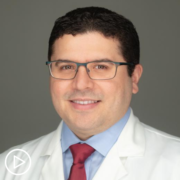Newly Diagnosed with Follicular Lymphoma? Start Here from Patient Empowerment Network on Vimeo.
How are follicular lymphoma treatment options commonly explained to patients? Expert Dr. Sameh Gaballa shares how he walks patients through treatment options, POD24 and FLIPI tests that help guide treatment options, and follicular lymphoma staging.
Dr. Sameh Gaballa is a hematologist/oncologist specializing in treating lymphoid malignancies from Moffitt Cancer Center. Learn more about Dr. Gaballa.
See More from START HERE Follicular Lymphoma
Related Resources:
Transcript:
Lisa Hatfield:
So, Dr. Gaballa, let’s start here. How do you explain follicular lymphoma treatment options and prognosis to your newly diagnosed patients? And what does shared decision-making look like in your office?
Dr. Sameh Gaballa:
Oh, absolutely. So follicular lymphoma, you really have to explain to the patient what, how are we coming to the recommendation that we’re currently giving. So if we think this is, this patient is a good candidate for a watch-and-wait approach, for example, we really have to walk them through why that really is the best option and not why should we jump on treatments and vice versa, if we think this patient needs to be treated, how do we really…the patient really has to understand all the other treatment options and why this needs to be treated. Because a lot of patients initially, sometimes when you present them with a watch-and-wait approach, if they don’t know all the background, they might not feel very comfortable because they might think, “Well, I have this cancer in me, and we’re not doing anything about it, and that doesn’t really sound too…something I should be doing.”
But then when you explain to them, “Well, you see, you don’t have a lot of disease, those studies have already been done in the past where patients who were treated or not treated, the survival was the same, so there, you might get side effects from the treatment, but not necessarily have benefits. And in the future, should this need to be treated, we have a lot of things to do.” So, really, so this is kind of the shared decision portion where you just have to walk the patients through why that will be the best situation. There is data with single-agent rituximab (Rituxan), even in patients who are asymptomatic, and we have the UK data, and that’s an option.
And that is also offered to some of the patients, even if they’re not symptomatic and they don’t have a lot of disease, if that’s what really the patient wants, if they’re not really comfortable with a watch and wait. And there’s again some data to help justify that. Again, there’s no advantage in overall survival, but sometimes the patients would kind of feel more in control. They feel like, “Okay, I did something about it.” So that’s the shared approach.
In terms of your other question about prognosis, unfortunately that’s an area of an unmet need. I mean, we have some tools to help us differentiate follicular lymphoma patients from each other, which patient is high-risk, meaning those are the patients who might relapse quickly, or they might not respond well to treatments. Unfortunately, we don’t have great tools. We have something called a FLIPI score, which is, we use a number of parameters including clinical parameters like stage or age and some other parameters as well, and we have a scoring system. But it doesn’t 100 percent predict if this is going to be a high-risk follicular lymphoma or a low-risk.
Unfortunately, the best predictor of prognosis for follicular lymphoma, you would know about retrospectively, it’s something called POD24, progression of disease in 24 months. Meaning that if you have a patient who’s treated with chemotherapy and immune therapy, and then they go into remission, and then they relapse again in less than 24 months, progression of disease within 24 months, those are the, those represent about 20 percent of follicular lymphoma patients, and those represent a high-risk group of patients. That’s the best tool that we have. But unfortunately, if you’re diagnosed today, you’re not going to know if you’re in this group or not until you actually need to be treated and not just treated with immune therapy.
It has to be with chemotherapy as well. And then if you relapse within two years, then we know that this is a high-risk entity. There is genetic testing, there is something called a FLIPI-m7 scoring system. But again, these tools are not great to tease out the low risk from the high-risk follicular lymphoma patients. But 80 percent of patients who are not going to be POD24, meaning that they get treated, they’re in remission for two years or more, and actually those patients have very similar survival to the general population. So, yeah, so a lot of times we don’t know right away, but we do have some tools to kind of give us an idea.
Lisa Hatfield:
Great. Thank you for that information. It’s kind of hard for cancer patients to only know what their prognosis is retrospectively, but that’s a great explanation. Thank you. Okay, another patient question, “How does the staging of follicular lymphoma impact treatment choices?”
Dr. Sameh Gaballa:
Yeah, so as you saw, I didn’t really stress too much about staging, because it’s a blood disease. So the vast majority of patients are going to be what we call stage III to IV disease. So, obviously when you see a patient if if they, they might think that, “Oh my God, I have a stage III to IV cancer,” because that’s really what they’re familiar with. But follicular lymphoma is a blood disease, so by default it’s going to be in a lot of lymph nodes, it might be in the bone marrow as well, but stage III to IV disease follicular lymphoma doesn’t, that does not mean that this is a terminal cancer. Patients could live completely in normal life, even with a stage III to IV follicular lymphoma. This is not like a breast cancer or colon cancer where stage is everything.
But why do we have a staging system? Obviously, there’s a need to have staging system for all cancers, but clinically, the only time it makes a difference is there’s a small group of patients who have a truly stage I or II disease, meaning just one group of lymph nodes on one side of the diaphragm that may fit within one radiation field. So if you have someone who’s just coming in with one or a few groups of lymph nodes all in one place, we call that a stage I or II follicular lymphoma, not common, because again, most patients are stage III to IV. The only difference there is you can potentially offer those patients radiation therapy if it’s truly localized, but then you would need to do a bone marrow biopsy and confirm that it’s not in the bone marrow.
And if it is localized within one radiation field, that can be offered and we can sometimes give after radiation therapy, either observe it or consider giving rituximab afterwards. But that’s the only time where we’re going to mention staging, again, uncommon because most, the vast majority of patients are going to be stage III to IV. So why would we do that? Why would we irradiate if it’s only one group of lymph nodes? Because there’s about, I mean, if you irradiated, those lymph nodes will go away, but there’s about maybe a, it’s different. The number is different between studies, but about maybe a third of patients, if you irradiate that group of lymph nodes or one lymph node, it actually might not come again in the future. So you might have very long remissions/possible cure if you…and this is the only situation where we would consider treating someone who does not have symptoms, because you could have very long remissions with radiation.
Share Your Feedback:
![<script>” src=”data:image/gif;base64,R0lGODlhAQABAIAAAAAAAP///yH5BAEAAAAALAAAAAABAAEAAAIBRAA7″ alt=”<script>]() Create your own user feedback survey
Create your own user feedback survey












